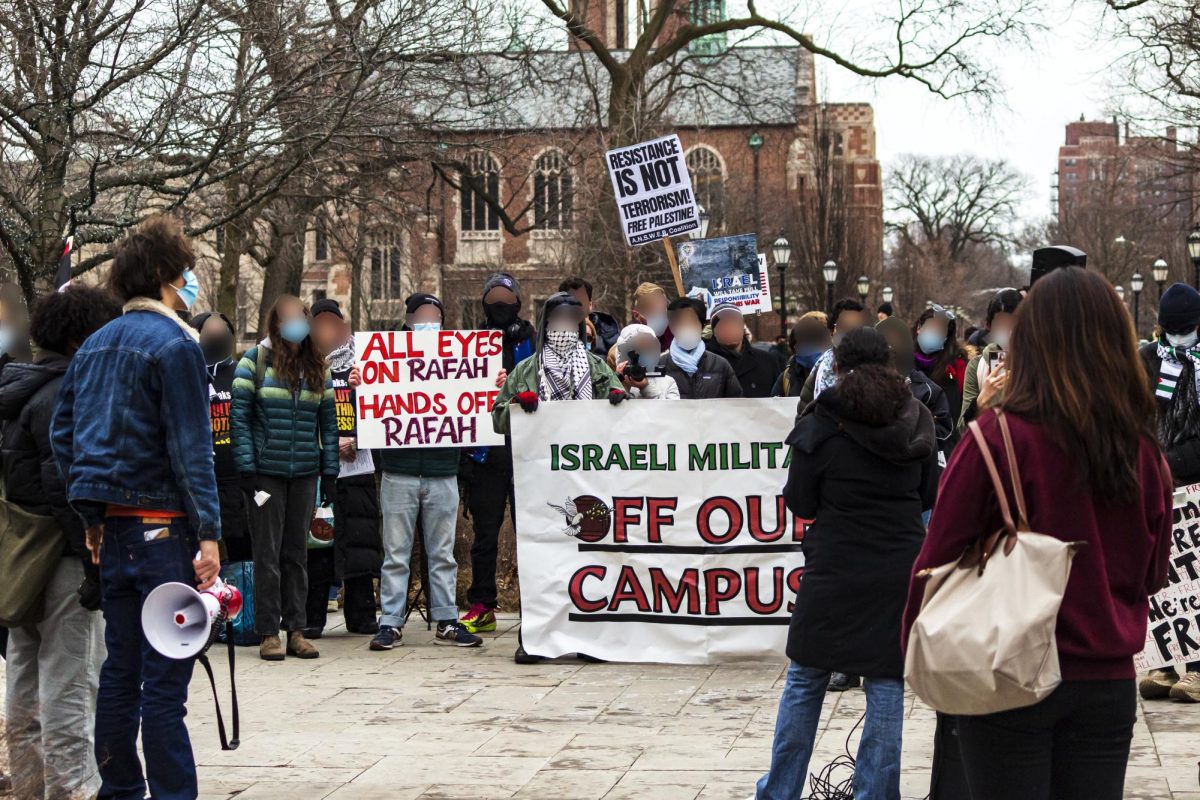Students for Justice in Palestine at UChicago (SJP) led a rally on the University’s main quad on Friday, February 16. The two major catalysts for the protest were Israel’s current bombardment of the city of Rafah, and the University’s disciplinary hearing against SJP.
Located in the southernmost area of the Gaza Strip, Rafah has been referred to as the last safe zone for approximately 1.4 million Palestinian refugees. Israel’s ongoing attacks on the city have sparked a new wave of protests globally and across university campuses in the United States. Israel has threatened a ground invasion of Rafah if Hamas does not free hostages before Ramadan, which begins on March 10.
The protest also took place on the same day as the University’s formal disciplinary hearing against SJP. Convened and adjudicated by the University-wide Standing Committee on Disruptive Conduct, the hearing addresses two incidents from autumn quarter: SJP’s alleged disruption of a counter–rally on the quad in October and SJP’s blockade of Levi Hall in November.
According to University administrators, SJP’s activities violated the University’s principles of free expression and constituted the designation of “disruptive conduct” supplied by University Statute 21. The University is following its disciplinary processes to investigate this allegation of disruptive conduct.
The demonstration began at 12:30 p.m. SJP protestors were joined by UChicago United for Palestine (UCUP), a larger coalition that SJP is part of, as well as allied students, faculty, and community members. More than a hundred people were present at the rally, chanting, drumming, and waving signs under the direction of SJP organizers.
Members from UCUP and the wider SJP community in Chicago addressed the gathered protestors, condemning the University’s financial ties with arms manufacturers that equip the Israeli military. In 2020, The Maroon found that the University invests in weapons manufacturers. Speakers also criticized the administration for its perceived disregard and “institutional censorship” of the SJP movement.
“In December, UCUP organizers got [UChicago President] Paul [Alivisatos], on camera, saying that he would meet with students, and still, admin has refused to meet with UCUP. All the while strengthening their connection to Western imperialism, settler colonialism, and apartheid by doing things like meeting with the Israeli Consulate General,” Sanya Bhartiya, a third-year student organizer, said during her speech.
At 1 p.m., the protestors proceeded towards Levi Hall and marched around the building. After a few encirclements, the crowd then advanced towards Rosenwald Hall. During the whole demonstration, the entrances of Levi Hall and Rosenwald Hall were fenced off and guarded by several campus security officials. A Dean-on-Call, a University administrator who provides support, referrals, and intervention, was also present.
According to a statement from University officials, “the University’s Department of Safety and Security was on site to ensure that the rally did not disrupt University operations or violate the University’s occupancy limits.”
In alignment with disciplinary procedures, the University’s order for a formal disciplinary hearing followed SJP’s decision to reject the informal sanctions presented by the University. According to UCUP’s written statement to The Maroon, the informal sanctions previously offered to SJP were “1) an official warning; 2) an educational sanction requiring SJP to create an infographic on how to hold non-disruptive protests in line with University regulations; and 3) disciplinary probation for a year, which would force SJP to disband after another ‘disruptive’ event.”
SJP denounced the University’s disciplinary process. “The disciplinary process here is completely illegitimate,” one organizer, a third-year undergraduate at the University, explained. “Time and time again, we see protests succeed precisely because they’re disruptive. Civil rights activists held sit-ins, blocked highways. They made noise. They were inconvenient. If a campus protest is ‘non-disruptive’—well, then, that’s a really lucky coincidence for admin, since they can kick up their feet and ignore it. But if we do something that gets their attention, they want to disband us.”
The rally concluded around 2:30 p.m. The University’s admissions office, located in Rosenwald Hall, closed at 2 p.m. on Friday, according to a source with knowledge of the situation. In a statement to The Maroon, the University declined to say whether this was in response to UCUP’s protests. SJP affirmed that they will continue to advocate for the cause of Palestinian freedom and oppose the University’s investments.
“Our movement is not an extracurricular activity, it is a collective commitment to breaking down the systems that oppress us.… We will not stop until Palestine is free and until our university is no longer complicit in atrocities,” Bhartiya said.








